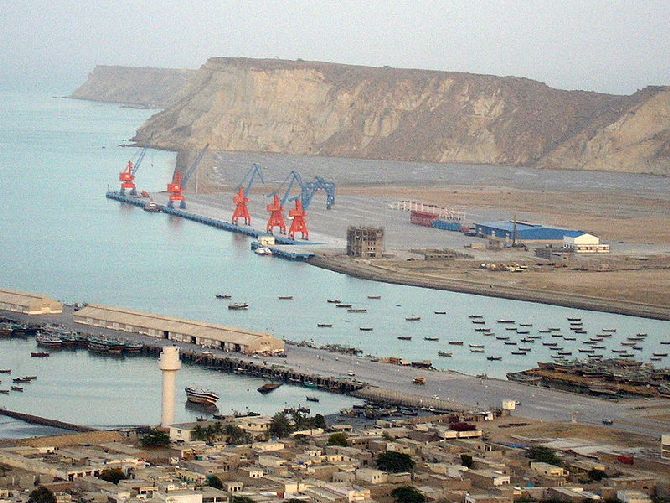China's construction of military base in the strategic location of Djibouti is just the first of what will likely be an ongoing expansion in friendly foreign ports around the world, says a Pentagon report.

China is likely to establish additional military bases in Pakistan and other countries with which it has longstanding friendly ties and similar strategic interests, a new Pentagon report said on Wednesday as the world's largest army increasingly flexed its muscles.
In its annual report to the Congress on China's military build-up, the United States Department of Defence said China's construction of military base in the strategic location of Djibouti is just the first of what will likely be an ongoing expansion in friendly foreign ports around the world.
China is expanding its access to foreign ports to pre- position the necessary logistics support to regularise and sustain deployments in the "far seas", waters as distant as the Indian Ocean, Mediterranean Sea and Atlantic Ocean.
"China most likely will seek to establish additional military bases in countries with which it has a longstanding friendly relationship and similar strategic interests, such as Pakistan, and in which there is a precedent for hosting foreign militaries," the Pentagon said.
The report cautioned, however, that China's efforts to build more bases "may be constrained by the willingness of countries to support" the presence of China's People's Liberation Army in one of their ports.
Notably, China is developing the strategically located Gwadar port in Balochistan, which many experts in the US say is aimed towards having a military presence.
"In February 2016, China began construction of a military base in Djibouti and probably will complete it within the next year," it said, adding China claims that this facility is designed to help the navy and army further participate in UN peacekeeping operations, carry out escort missions in the waters near Somalia and the Gulf of Aden, and provide humanitarian assistance.
This initiative, along with regular naval vessel visits to foreign ports, both reflects and amplifies China’s growing influence, extending the reach of its armed forces.
Reacting sharply to the Pentagon report, China said the US Defence Department has made "irresponsible" remarks about the country's military.
The annual report made "irresponsible remarks on China's national defense development and reasonable actions in defending our territorial sovereignty and security interests in disregard of the facts," foreign ministry spokeswoman Hua Chunying told reporters in Beijing.
"China is firmly opposed to that," she said, adding that Beijing was a force for safeguarding peace and stability in the Asia-Pacific region and the world.
While Hua declined to comment on possible overseas bases of the PLA, she said China and Pakistan were close friends that conduct mutually beneficial cooperation in a number of areas.
The Pentagon report said that China has cited anti-piracy patrolling as one of the reasons for developing what it calls a naval logistics center in Djibouti.
China’s expanding international economic interests are increasing demands for the PLA Navy to operate in more distant maritime environments to protect Chinese citizens, investments and critical sea lines of communication, it said.
China, the report said, uses PLA engagements with foreign militaries to enhance its presence and influence abroad, bolster its image and assuage other countries’ concerns about its rise.
"These engagements also assist PLA modernisation by facilitating the acquisition of advanced weapon systems and technologies, increasing its operational experience throughout and beyond Asia, and giving the PLA access to foreign military practices, operational doctrine, and training methods,” it added.
In 2016, China conducted counterpiracy operations in the Gulf of Aden by deploying its 24th naval escort task force to the area since 2008, it said.
"China also continued to send submarines to the Indian Ocean, ostensibly in support of its counterpiracy patrols. In May 2016, a nuclear-powered attack submarine conducted a port call in Karachi, Pakistan, during a visit by the People's Liberation Army Navy Commander, marking China’s first port call in South Asia by a nuclear submarine,” the Pentagon said.
"These submarine patrols demonstrate the PLAN’s emerging capability both to protect China's SLOCs and to increase China’s power projection into the Indian Ocean,” the report said.
According to the Pentagon, Pakistan is also China’s largest buyer of arms. From 2011 to 2015, China was the world’s fourth largest arms supplier with more than USD 20 billion in sales.
"Of this, USD 9 billion was to Asia-Pacific countries, primarily Pakistan,” it added.
Sub-Saharan Africa was China's second largest regional arms market.
"China's ability to remain among the world's top five global arms suppliers hinges largely on continued strong sales to Pakistan and demand for its armed UAVs. China is one of only a few global suppliers of such equipment and faces little competition for sales to the Middle East and North Africa.
"This likely will result in the Middle East and North Africa surpassing Sub-Saharan Africa as China’s second largest arms export market,” it said.
Last year, China signed an agreement with Pakistan for the sale of eight submarines, it said, adding that the first four will be built in China, with the remaining four in Pakistan.
Other major Asia-Pacific customers of Chinese military equipment include Bangladesh and Burma, it said.
China sold armed UAVs to several states in the Middle East and North Africa, including Iraq, Saudi Arabia, Egypt, and the United Arab Emirates, the Pentagon said.
China spent USD 180 billion on the People's Liberation Army last year, the report said. But experts said that figure could not account for all spending due to poor accounting transparency. That estimate is significantly higher than China's official defence budget of about USD 140 billion.










